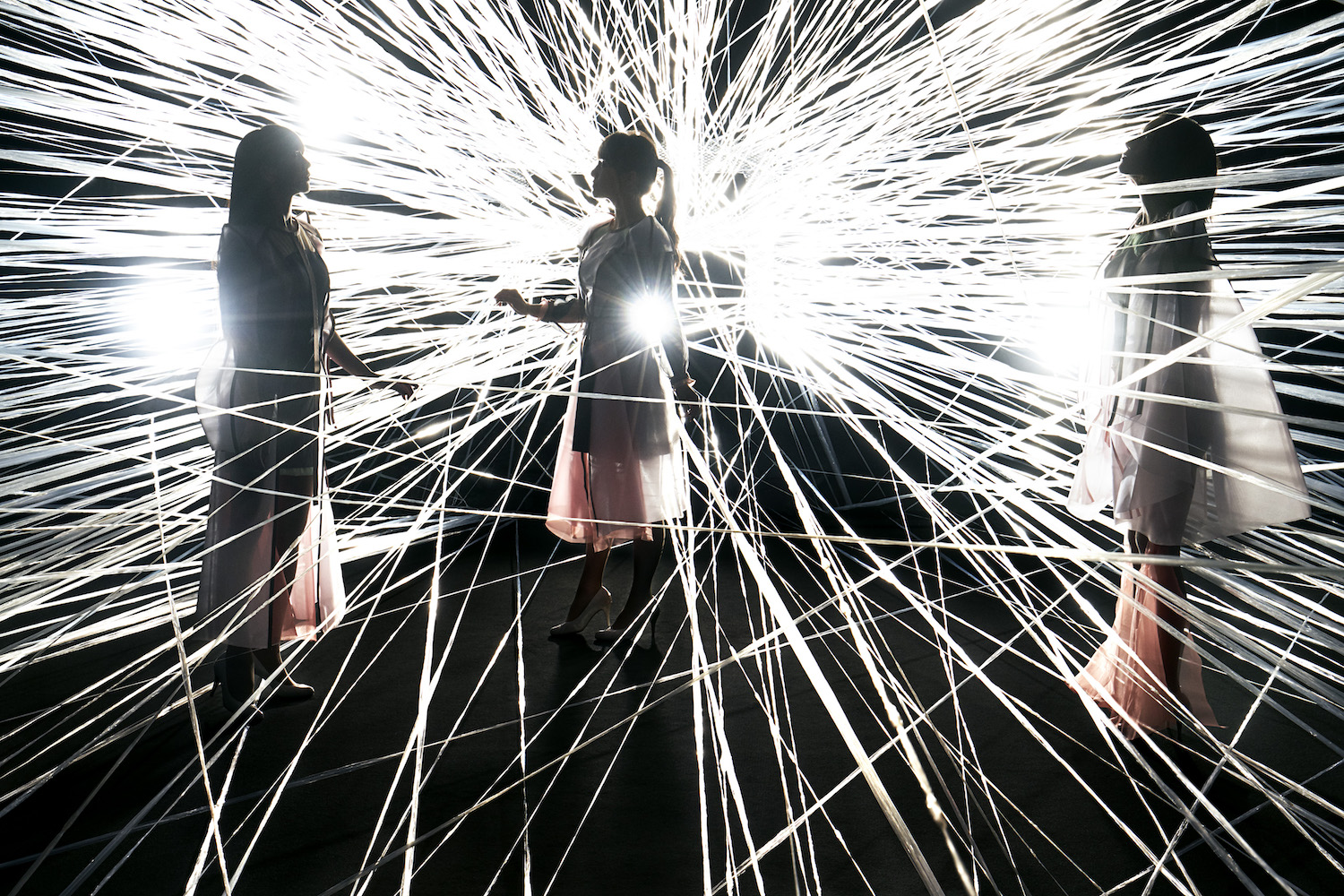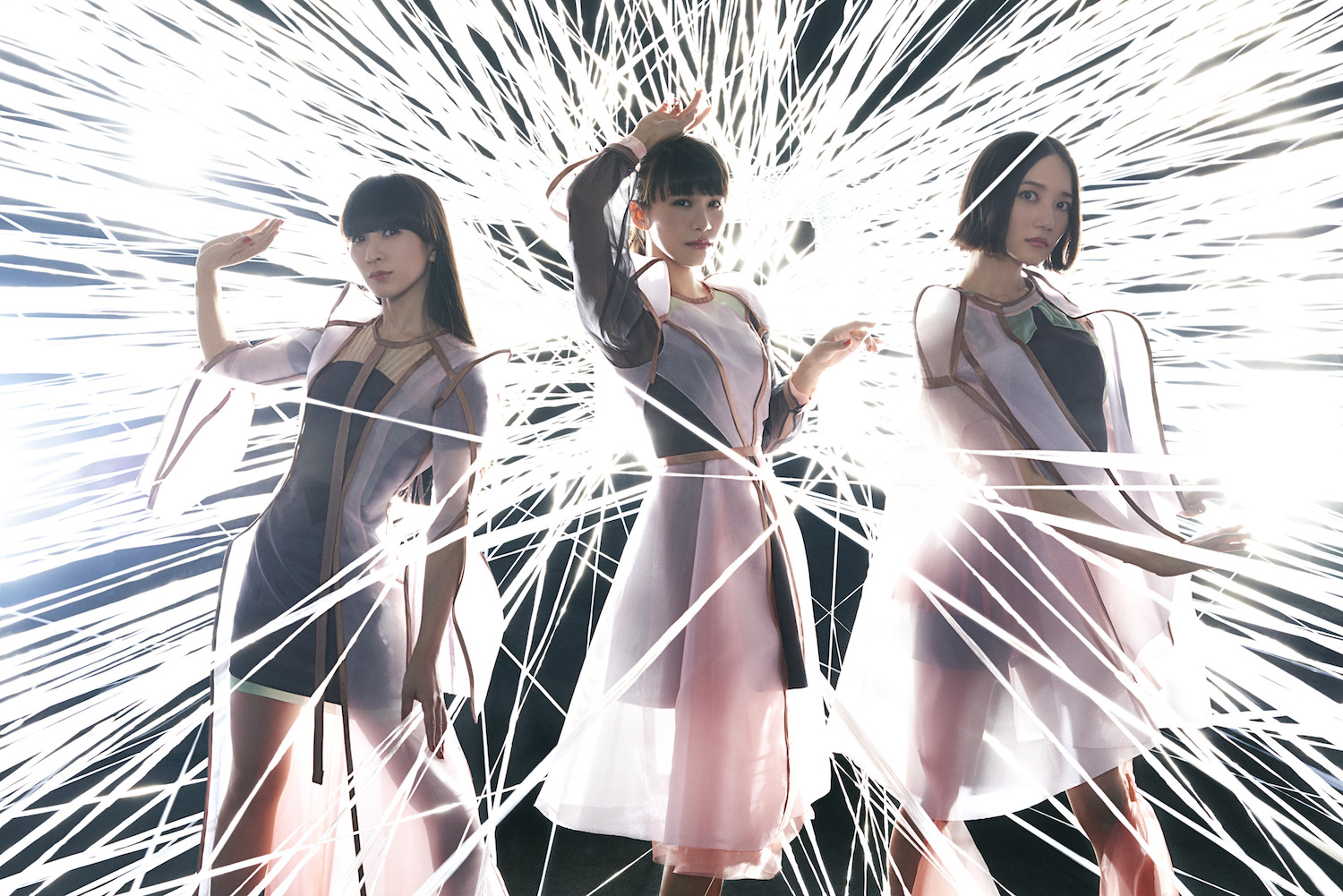For nearly two decades, Perfume has been one of the most successful bands to come out of Japan. While the J-Pop trio has gone through many iterations since their formation in 2000, they’ve shied away from being a part of a genre that’s super kawaii. Instead, A-Chan, Kashiyuka, and Nocchi have moved into an edgier space when it comes to style (they have their own clothing line) and tech-heavy shows. And with their latest album Future Pop (released in August), they’re pushing the boundaries of what it means to be a J-POP “girl group.” It’s as if Grimes, Zedd, and CHVRCHES had a love-child.
Now, the band will play Coachella, and beginning in March, Perfume is about to embark on their first world tour in two years, which will feature the relationship between technology and body, spectator and performer. Ahead of their upcoming tour, we spoke with Perfume about about how they’re pushing the boundaries of J-Pop with edgier music, their fan base and the innovative technology at their shows.
How is Perfume transforming the J-POP scene?
KASHIYUKA: I think we’re entertaining everyone with the synchronicity of our dance moves. With the synchronized dance, we’re able to actually show our individuality and that’s the fun part of our performance. I think people pay attention to that.
A-CHAN: There are dance routines that you can only express with a big team but [it’s] just three of us. With that limited number of members, we’re showing tons of variations and expressions. I think people see that potential in our dance and performance.
Is the goal to get widespread recognition stateside?
K: Yes, it’s one of our goals, but not just in the US. I hope more people around the world will recognize J-POP, Perfume, and how interesting our performance is.
What have been the challenges in garnering a fan base in the US?
NOCCHI: For Americans, who have interest in Japan and J-POP, there are ways for them to reach us as they search into that culture, but I think it’s challenging to reach out to more mass music fans who aren’t necessarily J-POP fans. We need to work harder on that.
K: People seem to give us credit for our performance that we’re putting out in Japan, but we haven’t been able to bring the big production abroad in the same scale. We cannot put all the latest technology and production into our international shows so I think that’s challenging.
Why have you shied away from the kawaii side of J-pop?
N: Maybe in the US, people see all Japanese idols being “kawaii.”
K: We’ve never been in that kawaii scene here in Japan, and we’ve never felt that we fit into any of the scenes in the past.
A-C: Because we couldn’t fit into any of the scenes or genres, we were able to create a genre of our own as we had our break. We were able to get recognition for what we do as we got more famous but we just kept on doing what we did. As we continued doing that, people started supporting us at some point. We weren’t exactly “kawaii”, but we sure weren’t “rock” either. We don’t write our music so we’re not singer-songwriters. We didn’t change or aim to go into a certain direction, but because of that we’re here today as our own genre.
How did you incorporate tech and fashion into your latest release?
A-C: I think the song “Fusion” is a good example of how new tech is incorporated on this record. We split up and went to 3 different countries and performed live together. It challenged the synchronicity of our dance using new 5G connection. In terms of fashion, the outfits we wore for that performance were also interesting. During the live stream, three of us were cut up and edited live into one, like a right arm being me and left being Kashiyuka, with Nocchi’s body and right leg, and my left leg. Outfits were in three different colors, designed so that you can tell who’s body parts you’re looking at. Lights were three different colors to match the outfit. The design of the outfits was very decorative and asymmetrical, making the footage more interesting when we were cut up and edit into one. When we collaborate with latest tech, we used to decide on the tech part first then the outfits later, but now, we work on tech and fashion together to make the performance more interesting.

What made you decide to move toward the electro-pop space?
N: An encounter with the producer. Our manager at the time looked for a producer who would match Perfume and that’s how we met Yasutaka Nakata. His music was electro-pop, or we called it techno at the time, so that’s how we started going toward that direction. I think it was a great match.
How are you paving the way for other J-POP artists?
N: I think we paved the way for idols to appear on rock festivals.
A-C: I think J-POP idols started to aim at doing a show in Budokan after we did. It’s almost like a template now for idols, but back then, no one did. Our manager, at that time, was a rock person so he told us that musicians should be all about a live performance and your artist value [is proportional to] how many fans show up to your shows. I think we inspired younger idols in that way.
Tell me about the themes behind Future Pop .
A-C: These are new songs on the album, but when you listen, they also sound a bit nostalgic. The album is full of sound and melodies that make us remember our past. When you hear the word “future,” you think of time far beyond, but Nakata said that the music we’ve been putting out has become the genre [of] “future pop” now. He believed in us and led us here, but only Nakata knows the real theme.
N: In Japan, mainstream acts haven’t released much of “future pop” songs yet, so Nakata said that he wrote this album hoping to spread that genre further in Japan with Perfume challenging that genre.
What artists were you inspired by with this release?
K: Not necessarily [inspired by] for this release but I’ve been listening to Troye Sivan.
A-C: Tom Misch for me.
N: Pentatonix covered Perfume and performed at their concert here. That was inspiring, and I’ve been their fan ever since.
